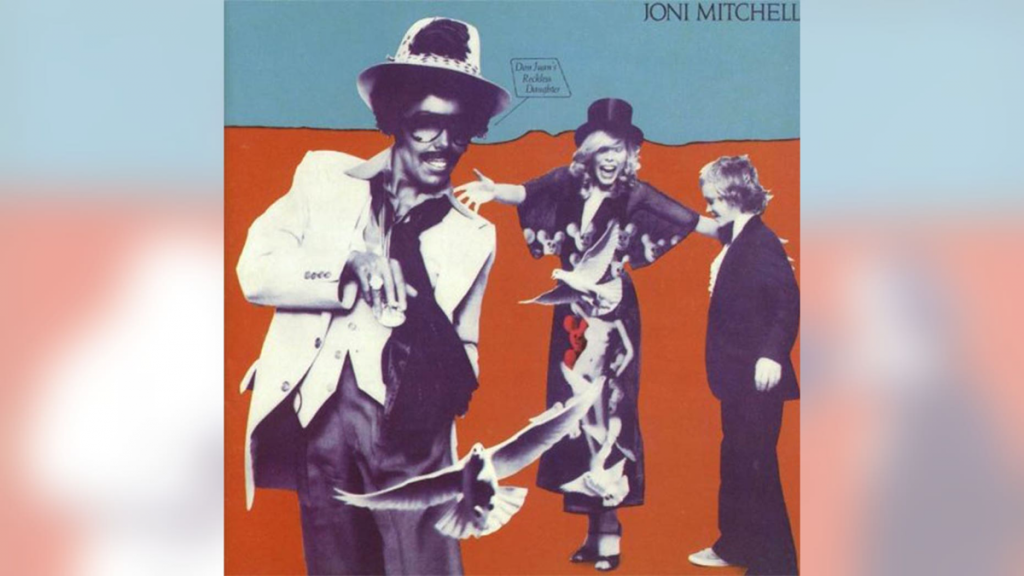Joni Mitchell Faces Accusations of Racism as Blackface Images Resurface

 The cover of Joni Mitchell’s 1977 album, Don Juan’s Reckless Daughter, which features the singer donning blackface (left) in her full ‘pimp alter-ego’ costume.
The cover of Joni Mitchell’s 1977 album, Don Juan’s Reckless Daughter, which features the singer donning blackface (left) in her full ‘pimp alter-ego’ costume.Joni Mitchell is facing serious criticism after decades-old images reveal the folk singer repeatedly wearing blackface as part of a full-blown ‘pimp’ costume.
The ugly images reveal that Joni Mitchell donned blackface on multiple occasions in the 1970s — and even showcased her alter-ego of a black male pimp on one of her album covers. The album cover, for Don Juan’s Reckless Daughter (pictured above), featured three pictures of the singer, with one a blackface costume of her ‘pimp’ alter-ego, “Art Nouveau”.
Critics also dredged up an image of Joni Mitchell dressing as Nouveau at a mid-70s Halloween party, with the BBC republishing the image in 2016. The BBC article, titled ‘When Joni Mitchell Wore Blackface for Halloween,’ also shows a second image of the singer wearing her elaborate blackface costume, possibly on a separate occasion.
The first image is credited to rock photographer Henry Diltz, while the second is owned by Getty Images. Diltz noted that few, if any, guests at the party knew that this blackface ‘pimp’ was actually Mitchell. “She dressed up like that to see if she could fool her friends and boy, did she,” Diltz commented. “Everyone in that room was her friend and none of us got it. She was proud that she could pull that off.”
The ugly images are resurfacing just days after Joni Mitchell removed her music from Spotify to protest Joe Rogan.
That timing isn’t accidental, and part of a highly-charged debate over COVID-19. Mitchell removed her music in solidarity with Neil Young, though the move prompted a wave of intense criticism and dirt-digging against the singers. Separately, homophobic comments uttered by Neil Young during the early-80s AIDS crisis also resurfaced within days of Young’s decision.
While Neil Young’s homophobic comments appear isolated, Mitchell’s penchant for blackface appeared far more serious. For starters, Joni Mitchell featured her blackface costume on an album cover. And more than a decade later, the singer had few qualms about her alter-ego. Asked to explain her repeated use of blackface and black appropriation, the folk singer offered this explanation to Q Magazine in 1988.
“I was walking down Hollywood Boulevard when a black guy walked by me with a diddy-bop kind of step, and said in the most wonderful way, ‘Lookin’ good, sister, lookin’ gooood’,” the singer described. “His spirit was infectious and I thought, I’ll go as him. I bought the make-up, the wig… sleazy hat and a sleazy suit and that night I went to a Halloween party and nobody knew it was me.”
But this gets worse. During the same interview, Mitchell not only used the n—word, she also explained ‘my blackness’ when confronted by the racism of blackface. This was part of a far deeper level of appropriation for Mitchell.
“I don’t have the soul of a white woman,” Mitchell later told LA Weekly. “I write like a black poet. I frequently write from a black perspective.”
Perhaps to prove her deeper black male identity, Joni Mitchell even went to the extreme to relay a story from her dentist. As recently as 2015, Mitchell told this to The Cut to discuss the inspiration for her 70s blackface alter-ego.
“I was being butchered by a dentist who was capping my teeth — and he was my dentist for about 12 years and one day he said, ‘Oh, you’ve got the worst bite I’ve ever seen. You have teeth like a Negro male.’”
During that same year, Mitchell said this to New York Magazine: “When I see black men sitting, I have a tendency to go – like I nod like I’m a brother… I really feel an affinity because I have experienced being a black guy on several occasions.”
Separately, Joni Mitchell’s Spotify removal is creating some unintended consequences.
In the case of Neil Young, nearly all of the singer’s songs were removed from the platform within 24 hours. But for Mitchell, the process wasn’t so easy. Geffen Records, which owns a sizable chunk of Mitchell’s later albums from the 80s and 90s, has yet to remove their catalog. According to Billboard, that has resulted in an explosion of streams for the five remaining releases, with many fans unaware of the later releases.
